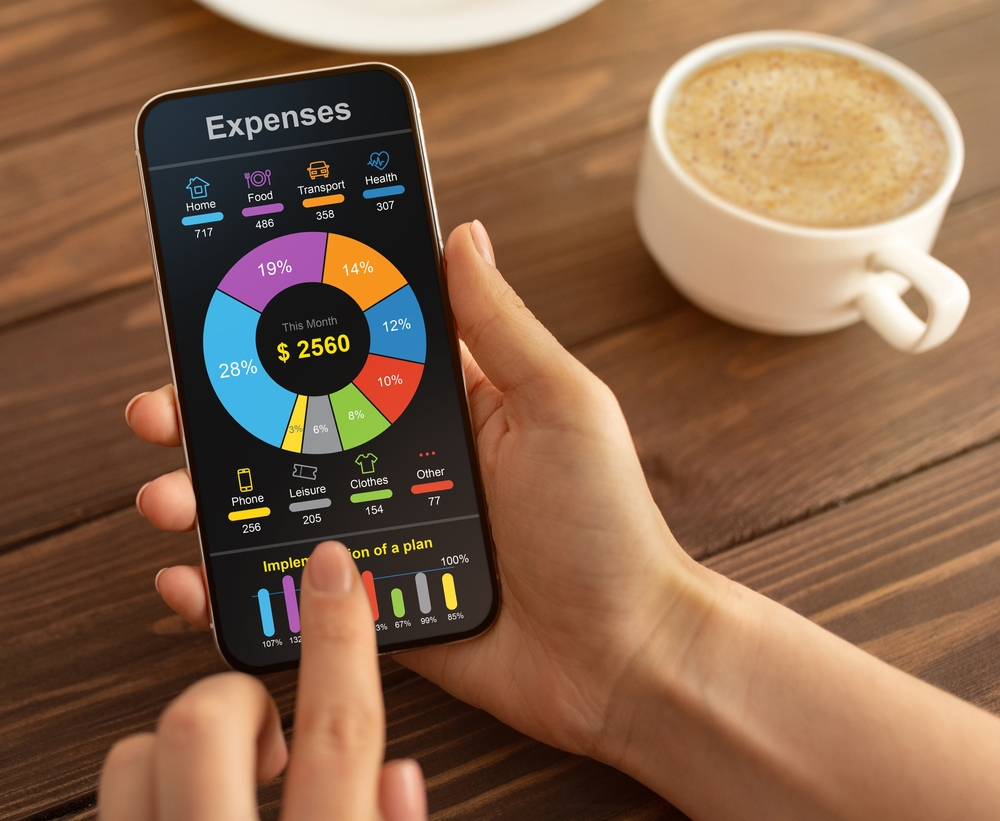The Unknown Secret Your Parents Never Told You About Track Spending

Do you ever feel like you’re constantly wondering where your money goes? You work hard for your paycheck, but at the end of the month, you’re left scratching your head, wondering how you managed to spend so much.
The truth is, tracking your spending is the unknown secret that your parents probably never told you about. Keeping track of your spending can have a lot of benefits. Not only does it help you understand where your money is going, but it can also help you create a budget that actually works for you.
In this article, we’ll explore the benefits of tracking your spending, different methods for doing so, how to set financial goals, and how to avoid common spending traps. By the end of it, you’ll be well on your way to embracing a lifetime of financial responsibility.
The Benefits of Tracking Your Spending
You may not realize it, but keeping track of where your money goes can have a positive impact on your financial well-being. By tracking your spending, you can better understand your habits and identify areas where you may be overspending. This can help you develop a budget and stick to it, leading to more control over your finances and less stress.
Tracking your spending also has other benefits, such as helping you save for future goals or unexpected expenses. When you know exactly where your money is going, you can adjust your spending to prioritize what’s important to you.
However, it’s important to note that tracking your spending can also come with challenges, such as the time and effort it takes to record every expense. But with the help of technology and apps, it’s easier than ever to keep track of your spending and reap the benefits it brings.
Creating a Budget That Works for You
When it comes to managing your finances, creating a budget that works for you is essential. This means taking a closer look at your income and expenses and figuring out where your money is going. By tracking your expenses, you can identify areas where you may be overspending and make adjustments to your budget accordingly.
Creating a budget can be daunting, but the benefits are worth it. Not only will it help you achieve financial stability, but it can also alleviate stress and anxiety around money.
Here are two sub-lists to consider when creating a budget:
Benefits of having a budget:
Peace of mind knowing exactly where your money is going
Helps you save money for emergencies or future goals
How to get started:
Identify your income and expenses
Categorize your expenses into needs and wants
Set realistic goals for saving and spending
Finding the Right Tracking Method for Your Lifestyle
Discover the perfect method to keep tabs on your spending and gain a sense of control over your finances, so you can live the life you want without financial stress. When it comes to tracking your expenses, there are two main options: digital or pen and paper. Digital options such as apps and online budgeting tools are convenient and allow for easy access to your spending data. On the other hand, some people prefer the tangible nature of pen and paper tracking. It’s important to choose the method that works best for your lifestyle and personality, as you’ll be more likely to stick with it.
In addition to choosing the right tracking method, it’s also important to decide on the frequency of tracking. Some people prefer to track their expenses daily, while others find it more manageable to track on a weekly basis. Determine what works best for you and your schedule. To make tracking your spending less time consuming and more rewarding, consider adding a rewards system or setting small goals for yourself. By making tracking a positive experience, you’ll be more likely to continue with it and see the benefits in your financial situation.
| Digital | Pen and Paper |
|---|---|
| Convenient | Tangible |
| Easy access to data | No need for technology |
| Automatic categorization | More customizable |
Keeping Track of Your Fixed Expenses
Learn how to easily keep track of your monthly bills and expenses with these simple tips. First, it’s important to distinguish between fixed and variable expenses. Fixed expenses are bills that stay the same each month, like rent, car payments, and insurance. Variable expenses, on the other hand, can vary from month to month, such as groceries, entertainment, and clothing.
To keep track of your fixed expenses, create a budget and set aside money for each bill. Make a list of all your fixed expenses and their due dates, and mark them on a calendar or planner. This will help you stay on top of your bills and avoid late fees. It’s also a good idea to automate payments for your fixed expenses, so you don’t have to worry about forgetting to pay them.
On the other hand, tracking variable expenses can be a bit trickier. This is where the importance of tracking non-essential spending comes in. Take a look at your bank statements and credit card bills from the past few months to see where your money is going. Once you have an idea of your spending habits, create a budget for your variable expenses. Set limits for categories like dining out, entertainment, and shopping, and track your spending to make sure you stay within those limits.
By keeping track of both your fixed and variable expenses, you can take control of your finances and achieve your financial goals.
Tracking Your Variable Expenses
You can easily take control of your finances and achieve your financial goals by mastering the art of tracking your monthly variable expenses. Variable expenses are the expenses that can vary from month to month, such as groceries, transportation, entertainment, and clothing. These expenses can add up quickly and can leave you wondering where all your money went by the end of the month. By tracking your variable expenses, you can identify where your money is going and make necessary adjustments to your spending habits.
To track your variable expenses, you need to develop daily habits that promote mindful spending. You can start by creating a budget for your variable expenses and sticking to it. Use a budgeting app or spreadsheet to keep track of your spending and make sure you stay within your budget. Another way to track your variable expenses is to keep receipts or use a debit or credit card that provides a detailed breakdown of your expenses. Once you have a clear understanding of your variable expenses, you can make informed decisions about where to cut back and where to invest more of your money.
Tips for Staying Consistent with Your Tracking
Now that you know how to track your variable expenses, it’s important to stay consistent with your tracking. Staying motivated and overcoming obstacles can be challenging, but it’s crucial if you want to gain control of your finances.
One tip for staying consistent is to set a specific time each day or week to track your expenses. This could be during your morning coffee or right before bed. Make it a habit and stick to it.
Another helpful tip is to use a budgeting app or software that can automate the tracking process for you. This will save you time and make it easier to stay on top of your finances.
Finally, don’t be too hard on yourself if you miss a day or forget to track an expense. Just pick up where you left off and keep going. Over time, you’ll start to see the benefits of consistent tracking and it will become second nature.
Analyzing Your Spending Habits for Areas of Improvement
It’s time to take a closer look at where your money is going and find ways to improve your spending habits. One effective way to do this is by analyzing your spending habits and identifying unnecessary expenses.
Start by reviewing your bank statements and credit card bills for the past few months and categorizing your expenses. This will help you see where your money is going and identify areas where you can cut back.
Once you have identified unnecessary expenses, it’s time to prioritize essential spending. This means making a list of your necessary expenses, such as rent/mortgage, utilities, groceries, and transportation, and ensuring that you have enough money to cover these expenses each month.
Any leftover money can then be allocated towards discretionary spending, such as entertainment and dining out. By prioritizing essential spending and cutting back on unnecessary expenses, you can improve your overall financial health and work towards your long-term financial goals.
Adjusting Your Budget Based on Your Findings
If you want to take control of your finances and start making progress towards your financial goals, it’s time to adjust your budget based on your spending habits.
Start by adjusting priorities in your budget. Look at the areas where you’re overspending and see if there are any expenses that can be reduced or eliminated. For example, if you find that you’re spending a lot on dining out, consider cooking at home more often or finding cheaper dining options.
By making these adjustments, you can free up money in your budget to focus on areas that are more important to you.
Another important aspect of adjusting your budget is flexibility. Your spending habits may change over time, so it’s important to be flexible and adjust your budget accordingly.
This means that you should regularly review your budget and make changes as needed. For example, if you get a raise or find a way to cut expenses, you may want to adjust your budget to allocate more money towards your savings or retirement accounts.
By being flexible and making adjustments as needed, you can ensure that your budget is always aligned with your financial goals.
Setting Realistic Financial Goals
You can achieve your financial dreams by setting realistic goals that align with your budget and lifestyle. Breaking barriers and overcoming obstacles is easier said than done, but with a clear vision and a solid plan, you can make it happen.
Start by identifying what you want to achieve financially, whether it’s paying off debt, saving for a down payment on a house, or investing in your retirement fund. Once you have a clear goal in mind, break it down into smaller, achievable steps. This will make it easier to track your progress and stay motivated along the way.
Remember to be realistic about what you can achieve within your current budget and lifestyle. Setting goals that are too ambitious can lead to frustration and disappointment, while setting goals that are too easy won’t give you the sense of accomplishment you need to stay motivated.
By setting realistic financial goals and taking small steps to achieve them, you can break down barriers and overcome obstacles to achieve financial success.
Celebrating Your Financial Wins Along the Way
Make sure to take the time to celebrate your financial wins along the way, as it’ll help you stay motivated and continue making progress towards your goals. Celebrating milestones is an important part of the journey towards financial freedom.
It can be easy to get bogged down in the day-to-day struggles of budgeting and saving, but taking the time to recognize your progress can be incredibly rewarding.
One way to celebrate your financial wins is by giving yourself small financial rewards. Maybe you’ve saved a certain amount of money towards your emergency fund, or you’ve paid off a credit card balance. Treat yourself to a nice dinner out or buy yourself something you’ve been wanting for a while.
These small rewards can help keep you motivated and excited about your progress, and can also reinforce good financial habits. Remember, celebrating your wins doesn’t have to be extravagant or expensive – the point is to acknowledge your hard work and give yourself a pat on the back for a job well done.
Avoiding Common Spending Traps
Congratulations on celebrating your financial wins! Now that you’ve established good habits and are on track with your spending, it’s important to stay vigilant and avoid common spending traps.
It’s easy to fall into the trap of impulse buying, especially when we’re bombarded with advertisements and social media posts showcasing the latest gadgets and trends. But giving in to those impulse purchases can quickly derail your financial progress.
One way to overcome impulse buying is to create a budget and stick to it. Make a list of your necessary expenses, such as rent, utilities, and groceries, and allocate a set amount of money for each category. When you have a clear understanding of what you can afford to spend, it’s easier to resist the temptation to splurge on unnecessary items.
Another helpful tip is to wait before making a purchase. If you see something you really want, give yourself a day or two to think about it. Often, you’ll find that the desire to buy fades away, leaving you with more money in your pocket.
By staying mindful of common spending traps and taking steps to overcome them, you’ll be well on your way to achieving your financial goals.
Embracing a Lifetime of Financial Responsibility
It’s important to consistently embrace financial responsibility throughout your lifetime, and this section will provide helpful tips and guidance to maintain good habits.
Developing habits and mindset for financial success is crucial to achieving long term planning and financial freedom. It all starts with creating a budget and sticking to it. This means tracking your spending, cutting back on unnecessary expenses, and finding ways to increase your income.
In addition, it’s important to educate yourself on financial matters. Read books, attend seminars, and seek advice from financial experts. This will help you make informed decisions about your money and avoid costly mistakes.
Remember, financial responsibility is a lifelong journey, not a one-time task. Embrace it, and you’ll reap the rewards for years to come.
Conclusion
Congratulations! You’ve taken an important step towards financial responsibility by reading this article. Tracking your spending can be a game-changer when it comes to achieving your financial goals.
It allows you to see where your money is going, identify areas where you can cut back, and make a realistic budget that works for you. By finding the right tracking method and celebrating your wins along the way, you can make financial responsibility a lifelong habit.
Remember to avoid common spending traps and set realistic goals for yourself. With dedication and discipline, you can take control of your finances and build a brighter future for yourself.
So what are you waiting for? Start tracking your spending today!





